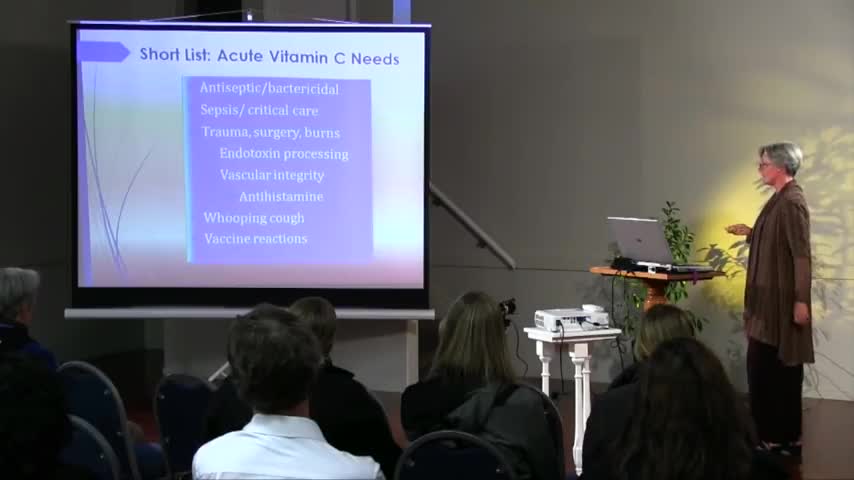Premium Only Content

Vitamin C basics - Dr Suzanne Humphries - Auckland, New Zealand - 2015
Vitamin C may function both within and outside of cells, neutralizing free radicals and preventing free radical damage. Vitamin C is a great supply of electrons (hydrogen) for free radicals striving to reestablish their stability. Therefore, vitamin C protects against damage caused by free radicals. Vitamin C doesn't get unstable after it donates an electron.
After donation GLUT10 (glucose transporter 10) facilitates transport of L-dehydroascorbic acid (DHA), the oxidized form of vitamin C, into mitochondria, the Mitochondria buffers and redoxes (glutathione) the (L)-dehydroascorbic acid. Glutathione and ascorbic acid are linked in a redox couple.
The Mitochondria produces a lot Reactive oxygen species (ROS) and these "free" oxygen atoms can become dangerous compounds if they aren't removed from the cell quickly.
Mitochondria are complex organelles that play a central role in energy metabolism.
-------------------------------------------------------------------------
Official Channel of Dr Suzanne Humphries: https://odysee.com/@drsuzanneh:f
-
 39:39
39:39
InnerLight
11 months agoMike Benz (Part 2): How the ‘Department of Dirty Tricks’ Turned on Americans - February 4, 2023
3.76K2 -
 21:26
21:26
Stephen Gardner
1 day ago🔥What JUST leaked out of Congress must be STOPPED NOW!
104K249 -
 53:25
53:25
tether
11 days agoStability and Freedom in Chaos: The Story of Tether USD₮ | Tether Documentary (USDT)
124K5 -
 56:44
56:44
VSiNLive
2 days agoFollow the Money with Mitch Moss & Pauly Howard | Hour 1
65.8K2 -
 36:50
36:50
Anthony Pompliano
2 days ago $15.66 earnedInvestors Are ALL-IN On Bitcoin
62.4K20 -
 32:19
32:19
SB Mowing
9 days agoA Backyard She’s NEVER Seen – Now Safe for the Kids to Play!
59.4K28 -
![[Day 26] CS Blast bounty baby](https://1a-1791.com/video/fwe2/8a/s8/1/Z/H/j/_/ZHj_w.0kob-small-Day-26-CS-Blast-bounty-baby.jpg) 2:09:11
2:09:11
ggezlol_tv
11 hours ago[Day 26] CS Blast bounty baby
91.6K3 -
 2:32:17
2:32:17
Sgtfinesse
10 hours ago💥Sunday Morning Hunt for Featherweight Artifact | New World PVP Server: Sclavia
93.1K4 -
 11:25
11:25
Film Threat
1 day agoLET'S DISCUSS THE 2025 OSCAR NOMINATIONS | Film Threat News
67.7K20 -
 13:07
13:07
DEADBUGsays
11 hours agoThe Southport Massacre, The Great British Cover-Up
57.1K36